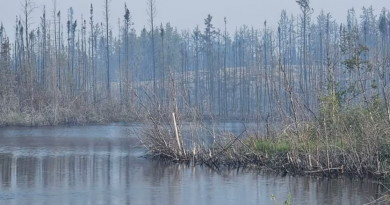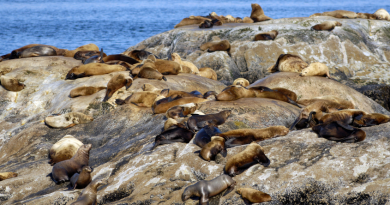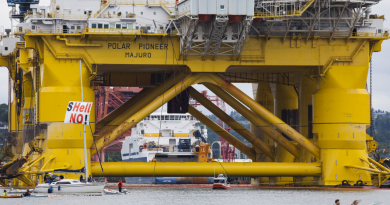Nuclear power plant construction in north Finland faces delay, upped costs, geopolitical uncertainties

Costs for the partly Russian-owned controversial plant will be €1 billion more than previously estimated.
“Further deterioration of political and commercial relations between the EU, the USA and Russia could lead to more sanctions between the parties. Such deteriorated international affairs and sanctions could influence the project’s schedule and financing, in particular,” Fennovoima writes in its updated construction license application to Finnish authorities on Wednesday.
Work on the site in Pyhäjoki south of Oulu is in full swing despite final permission for the reactor itself at Hanhikivi 1 nuclear power plant is not yet granted.
The original application was delivered in 2015, but as Fennovoima sees “changes in boundary conditions,” an updated application was made. Among other things, the application includes an additional survey on the power plant’s impact on the marine environment and fishery during operation.
Other changes are related to security and preparedness arrangements and design solutions, although, no changes to the key principles of the power plant, Fennovoima underlines.
“The rationale for the project is unchanged, and the scope of it will not be affected by the update. The power plant project will be implemented on the Hanhikivi peninsula in Pyhäjoki, as described in the original application,” Joachim Specht, CEO of Fennovoima, said in a statement.
Work continuing
The reactor to be built is of the 4th generation Russian-design pressure water type VVER-1200 with a capacity of 1200 MW, estimated to supply about 10% of Finland’s electricity needs.
Russia’s state-owned nuclear corporation holds a 34% stake in the plant. For Moscow, export of civilian nuclear power reactors is both a commercial revenue and a source of symbolic technology pride.
“Further deterioration of political and commercial relations between the EU, the USA and Russia could lead to more sanctions between the parties. Such deteriorated international affairs and sanctions could influence the project’s schedule and financing, in particular,” Fennovoima writes in its updated construction license application to Finnish authorities on Wednesday.
Work on the site in Pyhäjoki south of Oulu is in full swing despite final permission for the reactor itself at Hanhikivi 1 nuclear power plant is not yet granted.
The original application was delivered in 2015, but as Fennovoima sees “changes in boundary conditions,” an updated application was made. Among other things, the application includes an additional survey on the power plant’s impact on the marine environment and fishery during operation.
Other changes are related to security and preparedness arrangements and design solutions, although, no changes to the key principles of the power plant, Fennovoima underlines.
“The rationale for the project is unchanged, and the scope of it will not be affected by the update. The power plant project will be implemented on the Hanhikivi peninsula in Pyhäjoki, as described in the original application,” Joachim Specht, CEO of Fennovoima, said in a statement.
Project to feed 10% of Finland’s electricity needs
The reactor to be built is of the 4th generation Russian-design pressure water type VVER-1200 with a capacity of 1200 MW, estimated to supply about 10% of Finland’s electricity needs.
Russia’s state-owned nuclear corporation holds a 34% stake in the plant. For Moscow, export of civilian nuclear power reactors is both a commercial revenue and a source of symbolic technology pride.
Last week, government officials in the Czech Republic said they were kicking Rosatom out of the play for bidding at a planned new reactor for the Dukovany nuclear power plant. The move came amid the diplomatic turmoil between Prague and Moscow following a 2014 blast in a weapons storage which Czech intelligence blames Russian military spies for being involved.
Like with the Czech nuclear power plant, also Fennovoima’s Hanhikivi 1 reactor is planned to receive uranium fuel supplies from Russia.
Start-up in 2029
The updated license application says construction of the plan itself might begin in the summer of 2023, given the building license is granted by the Finnish authorities by the summer of 2022.
Current construction work at the site in Pyhäjoki includes workshops, administrative buildings, and early-stage groundwork.
“Commercial operation of the plant would thus begin in 2029,” the application reads. That is a four-year delay compared with the original plans.
Costs estimates climb significantly, up from €6,5-7 billion to now €7-7,5 billion. Fennovoima writes that this is “mainly due to the five-year delay in obtaining the construction license and, to a lesser extent, changes in the project’s scope of supply.”
The nuclear power plant will be the third in Finland and the northernmost in western Europe.
Related stories from around the North:
Canada: Community in northern Quebec to make the jump from diesel to hydroelectricity, CBC News
Finland: The world could transition entirely to cheap, safe renewable energy before 2050: Finnish study, Yle News
Norway: The quest to turn Norway’s Arctic coast into Northern Europe’s wind power hub, The Independent Barents Observer
Russia: Italian firm to build giant wind farm in northwestern Russia, The Independent Barents Observer
Sweden: Energy sector – Sweden will need twice as much electricity, Radio Sweden
United States: Despite winter darkness, solar power might work better in rural Alaska than you’d expect, Alaska Dispatch New



